March 8, 2024
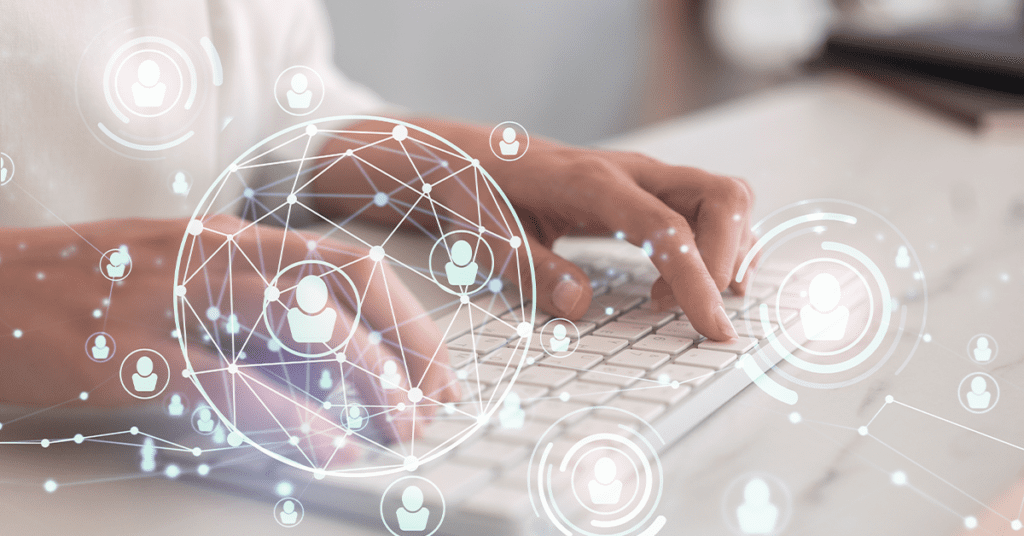

It seems everyone is talking about AI these days, but unlike many other trends, the hype around artificial intelligence is likely justified.
AI has found its way into just about every industry, from automotive to healthcare to fine art. And Human resources is no exception. So much so, 70% of business leaders believe that AI will be instrumental to success in HR over the next five years—and employees agree.
While there may be some understandable fear around this shift, there are also some AI tools for HR that will help HR professionals become more efficient, more creative, and more in touch with their employees.
Here, we'll explore some AI tools for HR, the benefits of AI in HR, and potential challenges.
6 Best AI Tools for HR
Here are six, highly-rated AI tools for HR that we'll dive into throughout this blog:
- Juicebox - AI search engine built for recruiting, customer discovery, research, and more.
- Zavvy - Run people development, performance, and training programs from one single place.
- Arract.ai - Tools to manage and track potential candidates throughout the recruitment process.
- Paradox - AI-powered recruiting assistant named Olivia.
- Effy - 360 feedback and performance review software built for teams.
- Leena ai - An AI-powered virtual assistant solution for streamlining internal workflows.
What are AI Tools for HR?
AI, or Artificial Intelligence, refers to the simulation of human intelligence processes by machines, especially computer systems. These processes include learning (the acquisition of information and rules for using the information), reasoning (using rules to reach approximate or definite conclusions), and self-correction.
AI tools for HR, also known as HR Tech or HR Tech AI, encompass a range of software applications and platforms that leverage artificial intelligence to streamline and enhance various human resources processes.
Some common AI tools for HR include:
- Recruitment Processes and Talent Acquisition
- Employee Onboarding
- Employee Engagement and Retention: Learning and Talent Development
- Performance Management
- HR Analytics
- Employee Support
Deep Dive: 6 AI Tools to Supercharge Your HR Teams


Juicebox
Juicebox is an AI-driven people search tool designed to help hr professionals with recruitment, customer exploration, research, and beyond. Juicebox has sophisticated search functionalities, enabling users to fine-tune their searches by specifying parameters like job title, location, and company association.
Juicebox utilizes AI technology to examine professional profiles and technical platforms, offering details about potential candidates. A notable aspect of Juicebox is its capacity to personalize email templates for outreach efforts, enhancing response rates while preserving the user's style and voice.
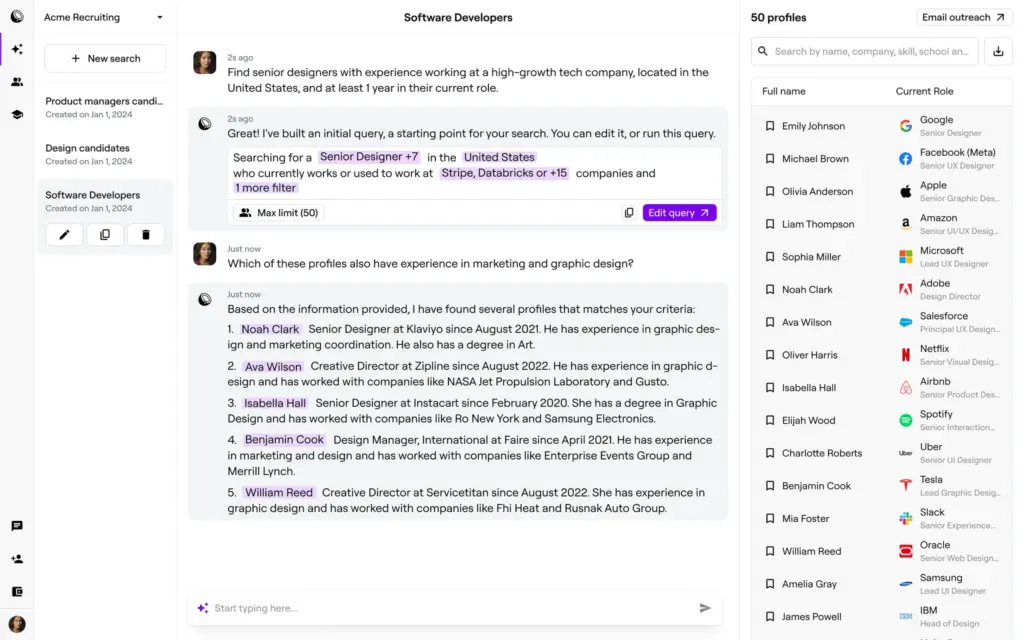

Key Features:
- AI-powered search: Juicebox goes beyond simple keyword searches. It uses AI to analyze a wider range of data sources, including professional profiles, technical websites, and even published papers, to find the most relevant candidates.
- Real-time search: Juicebox results are based on real-time data, ensuring you get the most up-to-date information about potential candidates.
- Context-driven search: Instead of relying on long lists of keywords, Juicebox lets you use a more natural way to search for candidates based on the specific needs of your role.
- Finds hidden talent: By using a more sophisticated search approach, Juicebox can help you discover qualified candidates who might not be easily found with traditional methods.
Zavvy
Zavvy AI is an employee enablement platform that helps businesses by providing tools for development, training, performance management, onboarding, and engagement.
Overall, Zavvy aims to be a one-stop shop for businesses to manage all aspects of employee development, from onboarding to ongoing learning and performance management.
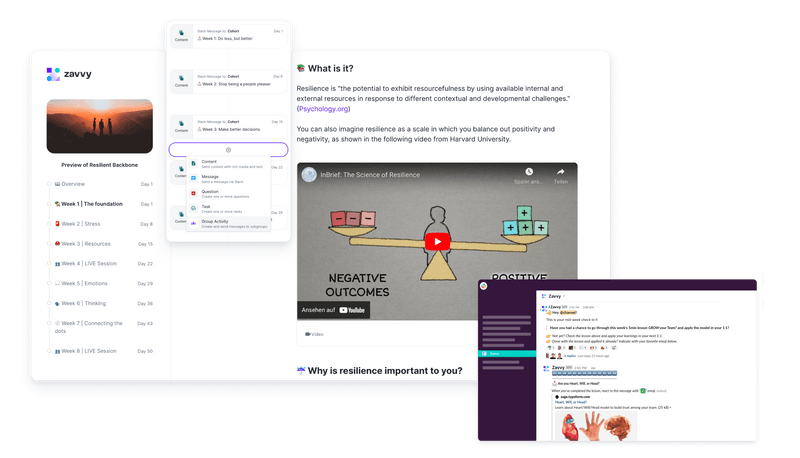

Key Features:
- Streamlined onboarding: Helps create a smooth onboarding experience for new hires by combining tasks, introductions, and training materials into a single, automated process.
- Career development tools: Provides features for creating career paths and setting development goals for employees. It can even use AI to help design these paths more efficiently.
- Continuous learning: Facilitates ongoing learning and development by allowing businesses to create and deliver training programs, manage learning materials, and track employee progress.
- Performance management: Offers features to conduct performance reviews and provide feedback to employees.
- Improved engagement: Includes tools to help boost employee engagement, such as sending employee surveys and encouraging connections between colleagues.
- Easy to use: Uses a no-code workflow builder, allowing businesses to create their own training content and programs without needing any coding expertise.
Attract.ai
Attract.ai is a software platform designed to help recruiters improve their talent sourcing. This ai tool utilizes AI to search for potential candidates across 40+ social media platforms. This goes beyond keywords, aiming to find relevant profiles even if they haven't actively applied for jobs.
The platform offers tools to manage and track potential candidates throughout the recruitment process and provides features to help recruiters reach out to and engage with potential candidates, such as pre-built outreach message templates.
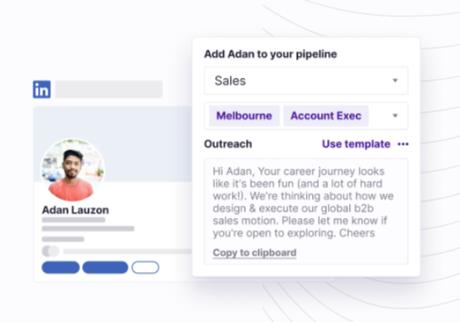

Key Features:
- AI-powered Talent Search: Attract.ai leverages AI to search a large pool of candidate profiles across over social media platforms. This can help recruiters discover qualified individuals who might not be actively applying or easily found with traditional methods.
- Streamlined Workflow: The platform offers a centralized hub for managing the entire talent sourcing process, potentially saving time and improving efficiency. This includes features for searching, managing candidate information, and outreach communication.
- Data-driven Insights: Attract.ai provides analytics and data to help recruiters optimize their top-of-funnel recruitment efforts. This data can be used to track conversion metrics, identify areas for improvement, and ensure diversity and inclusion (DE&I) practices are followed throughout the sourcing process.
- Candidate Engagement Tools: Attract.ai includes features to help recruiters personalize and improve outreach to potential candidates. This can include pre-built messaging templates, multi-channel communication options, and Chrome extensions to increase reply rates.
- Integration Capabilities: Attract.ai integrates seamlessly with existing recruiting software, allowing recruiters to leverage their current tech stack alongside the platform's functionalities.
Paradox
Paradox.ai offers software featuring an AI-powered recruiting assistant named Olivia. Olivia automates tasks typically handled by recruiters and HR teams during the early stages of the hiring process. Paradox screens candidates, schedules interviews, and answers frequently asked questions, freeing up recruiters' time to focus on more strategic aspects of hiring.
Overall, Paradox.ai offers an AI-powered solution to automate repetitive tasks in the early stages of recruitment, potentially improving efficiency and candidate experience, particularly for high-volume hiring needs.
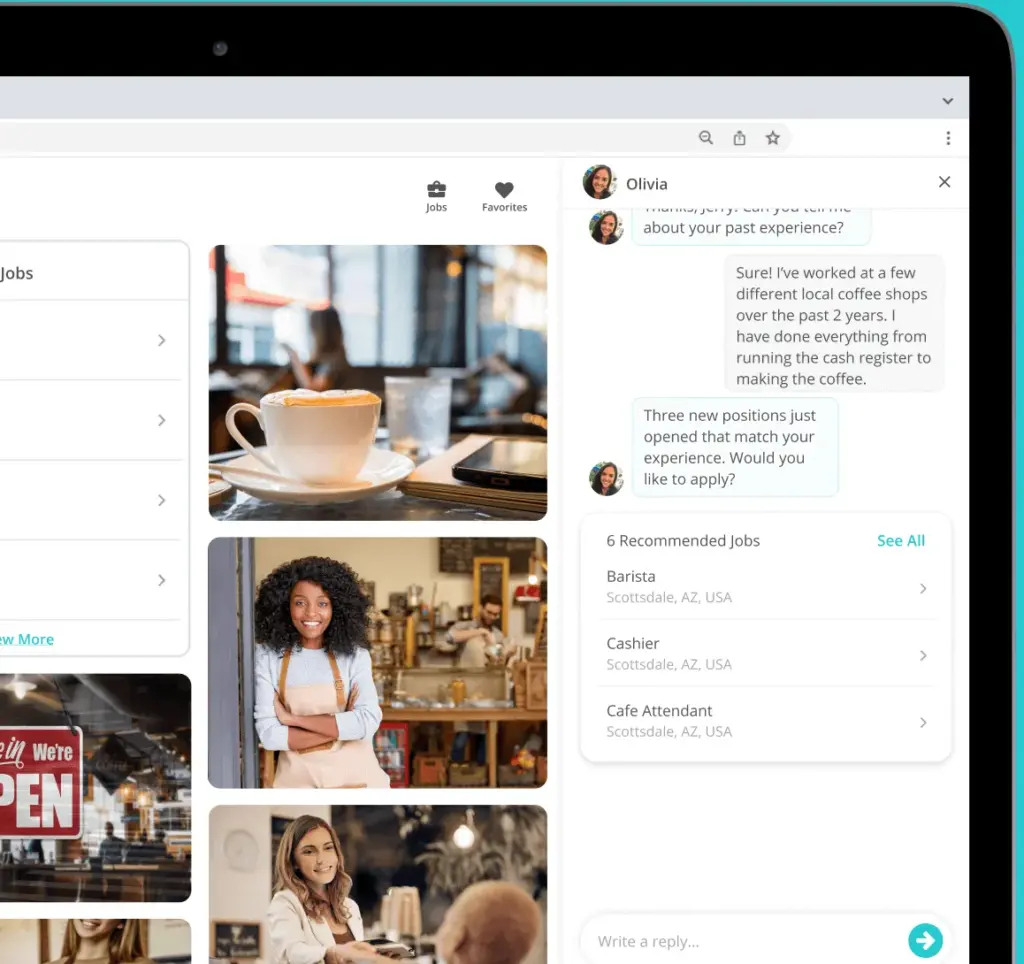

Key Features:
- Conversational AI Assistant (Olivia): Paradox's core feature is Olivia, an AI-powered assistant that handles many recruiter tasks through a text-based conversational interface.
- Automates Repetitive Tasks: Olivia streamlines the hiring process by automating tasks like candidate screening, scheduling interviews, and answering frequently asked questions. This frees up recruiters' time for more strategic activities like evaluating candidates and building relationships.
- Improved Candidate Experience: By offering a 24/7 conversational interface, Olivia can provide a more efficient and potentially more positive experience for candidates, particularly during the initial application stages.
- High-Volume Hiring Focus: Paradox.ai's solution is well-suited for companies with high-volume recruitment needs, especially for roles where filling a large number of positions quickly is crucial.
- Compliance Emphasis: The platform prioritizes data security and ensures adherence to relevant industry standards like GDPR and SOC 2.
Effy AI
Effy AI is a cloud-based platform for HR teams that uses artificial intelligence to streamline the performance management process for businesses. Effy automates repetitive HR tasks such as sending reminders for reviews, managing deadlines, and generating reports based on feedback.
The platform also facilitates the collection of feedback from various sources, including managers, peers, and even self-assessments. This can provide a more comprehensive view of an employee's performance.
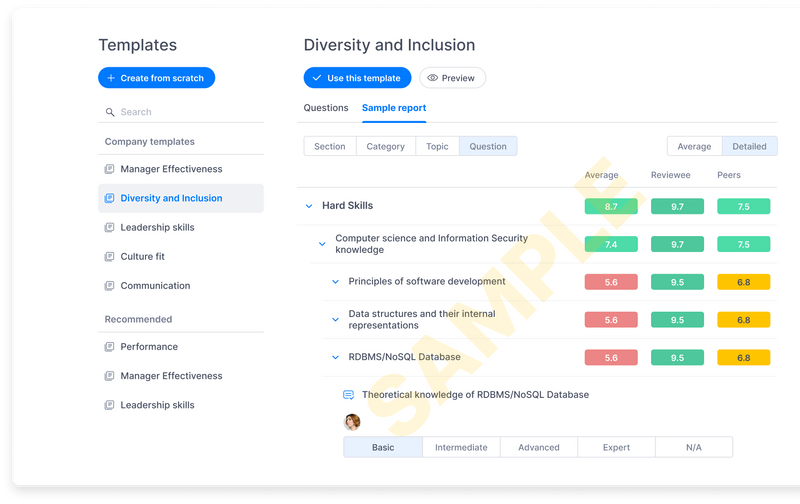

Key Features:
- Customizable Templates: Effy provides a library of pre-built templates for performance reviews, but it also allows for customization to fit the specific needs of different roles or departments within an organization.
- AI-powered Insights: Effy uses AI to analyze the collected feedback data and generate insights that can be used to identify areas for improvement, set development goals, and track progress.
- Easy-to-use Interface: Effy is known for its user-friendly interface, making it accessible for both HR professionals and employees. Additionally, it often integrates with popular collaboration tools like Slack, further streamlining the workflow.
Leena AI
Leena AI is an AI-powered enterprise virtual assistant designed to improve the employee experience. It focuses on automating tasks and providing information to employees within a company. It acts as a central hub for company knowledge.
Leena stores and organizes information from various sources like policies, FAQs, documents, and even historical support tickets. This allows employees to easily find answers to their questions through the platform.
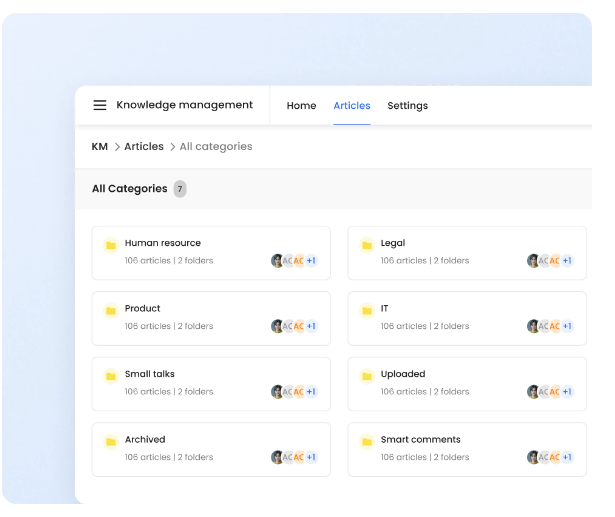

Key Features:
- Centralized Knowledge Hub: Leena acts as a one-stop shop for company knowledge. It integrates with various sources like policies, FAQs, documents, and past support tickets, providing employees with easy access to relevant information through a searchable platform.
- AI-powered Chat Interface: Employees can naturally interact with Leena through a conversational interface. Leena uses natural language processing to understand their questions and deliver the most appropriate information or complete tasks on their behalf.
- Automates HR/IT Tasks: Leena AI streamlines workflows by automating repetitive tasks commonly handled by HR or IT departments. This can include password resets, answering policy questions, or processing basic service requests, freeing up these departments for more complex issues.
- Reduces Ticket Volume: By offering employees self-service options and automating tasks, Leena AI can significantly reduce the overall volume of support tickets submitted to HR and IT, improving overall efficiency.
- Predictive Analytics: Leena AI leverages user data to identify trends and patterns. This data can be used to continuously improve the platform's accuracy and efficiency in addressing employee needs. It can also pinpoint areas where additional information or self-service options might be beneficial.


Benefits of AI Tools for HR
AI tools can offer a range of benefits to HR departments, revolutionizing the way they operate - from streamlining HR tasks to enhancing efficiency, accuracy, and the overall employee experience.
Some of these benefits include:
Streamlined Recruitment Process
Some AI-powered tools can automate candidate sourcing and resume screening, significantly reducing the time and effort required to find and hire qualified candidates.
Reduced Bias in Hiring
AI algorithms can help mitigate unconscious bias in the hiring process by removing gendered language from job descriptions and focusing solely on qualifications and skills, leading to fairer and more diverse hiring decisions. These tools can be particularly helpful for DEI initiatives and companies that have goals to improve diversity.


Personalized Onboarding
An area many companies struggle with is onboarding. While important, onboarding initiatives take time and energy to develop, and even then, they frequently train new hires in a one-size-fits-all approach.
AI-driven onboarding platforms can provide personalized training materials, resources, and support to new hires based on their role, experience level, and learning preferences, leading to faster integration and higher employee satisfaction.
Improved Employee Engagement
HR professionals everywhere understand the importance of employee engagement. But finding ways to actually engage employees can be a different story.
Some AI tools can be used to analyze employee feedback, sentiment, and behavior. This can give valuable insights and help leaders identify trends and patterns, enabling HR professionals to proactively address issues, improve communication, and enhance overall employee engagement.
Enhanced Performance Management
AI-powered performance management systems can provide real-time feedback, goal tracking, and performance analytics based on employee data, enabling managers to identify strengths, weaknesses, and areas for improvement more effectively.


Predictive Analytics
Predictive analytics is a branch of advanced analytics that utilizes statistical techniques, data mining, and machine learning algorithms to analyze historical and current data. It can then help make predictions about future events or behaviors.
AI-driven predictive analytics can analyze vast amounts of HR data to identify trends, predict turnover risks, and make data-driven decisions regarding workforce planning, succession management, and talent development.
Efficient HR Operations
AI-powered chatbots and virtual assistants can handle routine HR inquiries, such as employee queries about benefits enrollment, time-off requests, and policy questions, freeing up HR managers to focus on more strategic tasks.
Cost Savings
By automating repetitive tasks and streamlining processes, AI tools can help HR departments save time and resources, leading to cost reductions and increased operational efficiency.


Challenges of AI Tools for HR
While AI can be beneficial in many ways for HR teams, adopting new practices won't come without its challenges, and we'd be remiss to not shed light on what those may be.
Bias and Fairness
While AI can help oftentimes remove implicit bias, it can also inadvertently perpetuate biases. When bias is already present in historical data, AI can support unfair or discriminatory outcomes in recruiting, hiring, and other HR processes.
Ensuring fairness and mitigating bias will require ongoing monitoring, transparency, and algorithmic auditing. Remember, if a computer can't fire someone, it shouldn't be the one hiring them either.
Data Privacy and Security
AI tools rely on vast amounts of data, including sensitive employee information. Ensuring data privacy and security is crucial to protect employee confidentiality and comply with regulations such as GDPR and CCPA.
Organizations will need to implement robust data protection measures and ethical data handling practices when choosing to adopt certain AI tools.
Skills Gap and Training
Implementing AI tools will require employees to acquire new skills and competencies, such as data analysis, algorithmic understanding, and AI ethics.
So, HR departments will likely need to invest upfront in training and upskilling initiatives to ensure that employees can effectively leverage AI HR software and understand its implications.


Employee Trust and Acceptance
Introducing AI tools into HR processes may lead to concerns about job displacement, loss of autonomy, and algorithmic decision-making. So, building employee trust will be critical for the seamless adoption of new processes
Building employee trust and acceptance requires transparent communication, involvement in the implementation process, and demonstrating the benefits of AI tools for employees.
Complexity and Integration
Integrating AI tools into existing HR systems and workflows can be complex and challenging. Organizations may face compatibility issues, data integration challenges, and resistance from employees accustomed to traditional processes.
Effective change management and collaboration between the HR department, IT, and other stakeholders is essential for successful integration.
Algorithmic Accountability
While AI algorithms are great for mitigating human error, they can still produce unexpected or undesirable outcomes, leading to questions of accountability and responsibility. Organizations need mechanisms to monitor and evaluate AI performance, address errors or biases, and ensure accountability for algorithmic decisions.


Ethical and Legal Considerations
AI tools raise a range of ethical and legal concerns, so they shouldn't always be adopted lightly. From transparency to accountability to fairness, there can be many gray areas with AI. So, organizations will need to navigate ethical dilemmas, comply with relevant regulations, and adhere to ethical guidelines to ensure responsible AI deployment in HR practices.
Improve Employee Engagement with Terryberry
AI may be the next big thing in, but it's not the only tool HR professionals should be focused on. Employee recognition, rewards, surveys, and wellness combined with AI is a winning combination for any company.
The Terryberry Be Engaged Platform offers a comprehensive solution that can host your employee engagement efforts, including:
- Pulse Survey Software: Be Heard is an employee survey solution that's designed to enhance your employee experience while fueling business performance.
- Service Awards and Performance Awards: Recognize and reward employees based on years of service awards, anniversaries, or performance.
- Social Recognition: Empower your employees and managers to recognize their peers and celebrate successes with an easy-to-use social recognition application.
- Feedback and Communication: Unlock improved feedback and communications with employee and customer feedback solutions.
- Wellness Programs: We make it easy to run wellness programs and activity challenges that increase engagement, expand corporate health, and build team camaraderie.
Contact Us
Ready to learn more? Schedule a demo with our team to get a hands-on walkthrough of how Terryberry can transform the work culture at your company.


